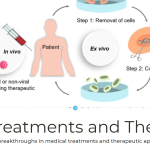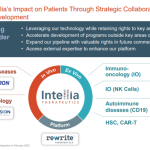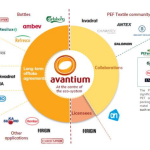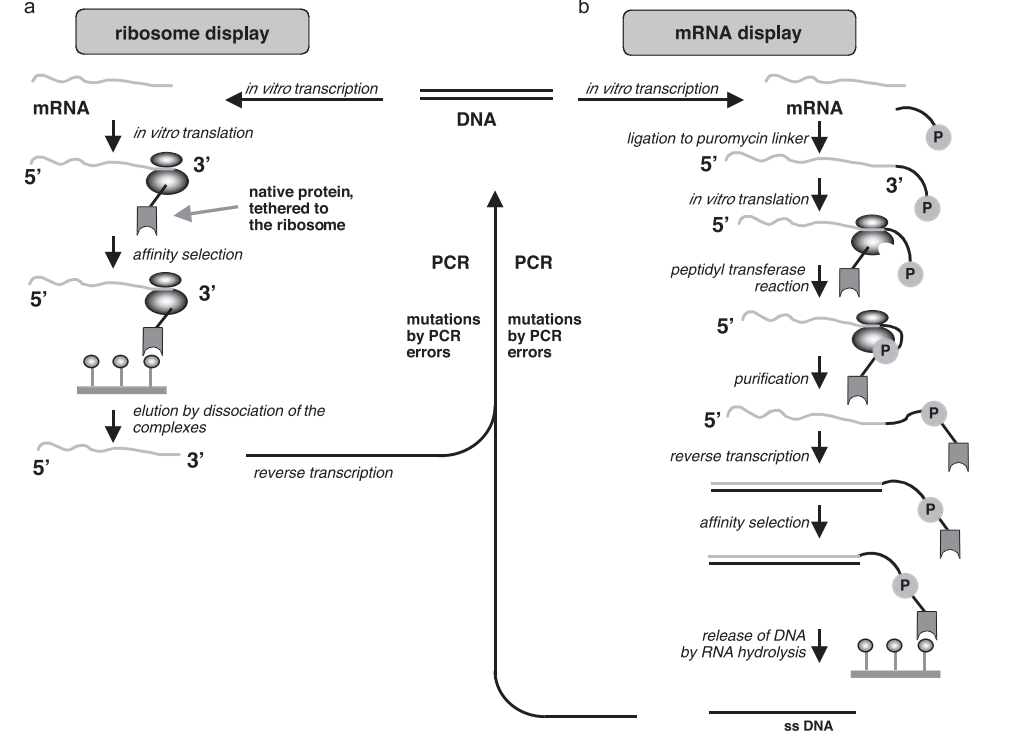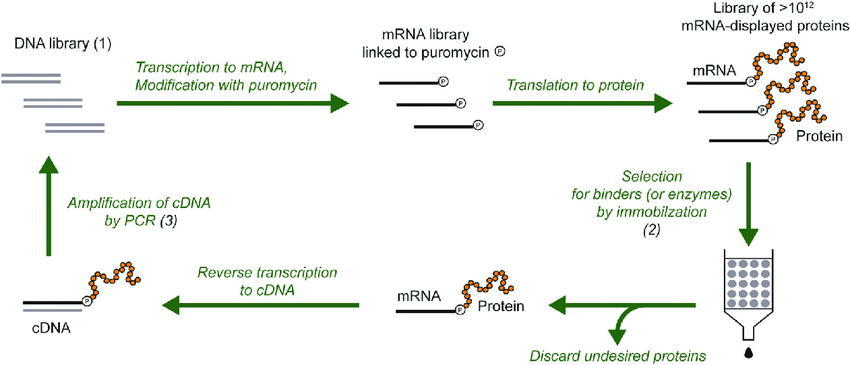Glucose metabolism refers to all processes involved in breaking down or re forming glucose. Glycolysis is the process of breaking down glucose into molecules such as pyruvate and ATP. It occurs within the cytoplasm and does not require oxygen. This makes glucose an anaerobic process. In the absence of oxygen, the pyruvate molecules formed during glycolysis will undergo a process called fermentation. Some cells use alcohol fermentation to convert pyruvate into ethanol. Other cells use lactic acid fermentation to convert glucose into lactic acid (or lactic acid, its conjugated base). Under aerobic conditions, pyruvate molecules will enter mitochondria, where they will undergo pyruvate decarboxylation and citrate cycle (also known as Krebs cycle) to produce carbon dioxide and many ATP molecules. Glycolysis, decarboxylation of pyruvate, and the Krebs cycle constitute aerobic cellular respiration. When the energy supply inside the cell is sufficient, our cells will convert glucose into glycogen. Meanwhile, cells will also convert pyruvate and lactate back into glucose through a process called gluconeogenesis. Heterogenesis and glycolysis usually do not occur simultaneously; When one is open, the other is closed. In order to break down the polysaccharides that enter our body through food intake, our body produces and utilizes many digestive enzymes. Some of these enzymes include saliva and pancreas α- Amylase, maltase, sucrase, lactase, α- Dextrinase and α- GlucosidaseThis section mainly discusses the relevant content of glucose metabolism. Glucose metabolism is actually the process in which the body converts the chemical energy stored in covalent bonds of sugar molecules into the energy of covalent bonds of ATP molecules, as ATP molecules ultimately bear the energy for various life activities. This includes the generation of membrane electrochemical gradients and the consumption of ATP (skeletal muscle, cardiac muscle, smooth muscle) during muscle contraction.

The metabolism of glucose is divided into many steps, with the first step being glycolysis. Glucose breaks down into 2 molecules of pyruvate in the cytoplasm and produces a net 2 molecules of ATP (which can be utilized by NADH molecules). Ultimately, glycolysis produces some byproducts called pyruvate.
Glycolysis does not require oxygen and can easily occur without oxygen. This makes it an anaerobic process. Under anaerobic conditions, pyruvate molecules undergo a process called fermentation and are converted into lactic acid or ethanol.
However, under aerobic conditions, pyruvate can be transferred to the mitochondria within cells, performing reactions such as pyruvate decarboxylation, lactate cycle, and the electron transport chain that occurs on the inner membrane of mitochondria.
Some organisms can utilize O2 within mitochondria to ultimately convert pyruvate molecules into carbon dioxide and ATP molecules. Most of the ATP molecules produced by the body pass through this pathway
Glycolysis Metabolism Assay is an indispensable instrument in the field of cellular energy production studies, playing a pivotal role in our understanding of how cells convert nutrients into energy. This assay is a central element of cellular respiration research, a field that is crucial to many areas of biological and medical exploration.
Glycolysis, the process that this assay measures, is the transformation of glucose into lactate. It is one of the primary mechanisms that cells use to produce energy, and understanding its intricacies is fundamental to a wide range of scientific disciplines. The Glycolysis Metabolism Assay enables us to measure the rate of this metabolic process. The data obtained from this assay provides a comprehensive and in-depth view of the metabolic activity of cells. It allows for the detailed examination of cellular energy production and utilization, revealing critical information that is of paramount importance in various areas of biological and medical research.
In real-world scenarios, the Glycolysis Metabolism Assay is particularly useful in investigating diseases that significantly impact cellular metabolism. Such diseases include, but are not limited to, cancer and diabetes. These conditions often involve alterations in the way cells metabolize energy, changes that can have profound effects on the disease’s progression and its overall impact on the body. When researching these diseases, the Glycolysis Metabolism Assay allows scientists to delve deeper into understanding the disease’s influence on cellular functions. It provides a pathway to new insights, potentially paving the way for breakthroughs in devising effective treatment approaches.
The most common method for performing a Glycolysis Metabolism Assay involves the use of a fluorescent dye. This dye is sensitive to changes in pH levels, an aspect that is crucial to the glycolysis process. As the glucose metabolizes into lactate, the pH of the solution decreases. This decrease in pH corresponds to the increased acidity, a direct result of the glycolysis process. The fluorescent dye can detect this change in pH, thereby providing a quantifiable measure of the glycolysis rate. This method has proven its reliability and effectiveness in a variety of research settings, making it the preferred approach for many scientists.
Our company is a specialist in providing Glycolysis Metabolism Assay products. We offer comprehensive kits that contain all the necessary reagents required to perform the assay. These kits are designed with the user in mind, ensuring that the process is as straightforward as possible. This design consideration makes it accessible to individuals who may be relatively new to this type of research. Furthermore, we don’t just supply the kits; we also offer extensive support services to aid researchers in interpreting their results. Our team, with its wealth of experience, is available to provide guidance and assistance. We are committed to ensuring that you can fully leverage the Glycolysis Metabolism Assay and the valuable data it produces, driving forward the frontier of cellular respiration research.
| Category | Subcategory | Product Name | Catalog Number | Price |
|---|---|---|---|---|
| Enzyme Kits for Nutrients and Metabolites | Glycolysis Metabolism Assay Kits | GPDH Activity Assay Kit | EK0191 | Online Inquiry |
| Enzyme Kits for Nutrients and Metabolites | Glycolysis Metabolism Assay Kits | Triose Phosphate Isomerase Activity Assay Kit (Colorimetric) | EK0199 | Online Inquiry |
| Enzyme Kits for Nutrients and Metabolites | Glycolysis Metabolism Assay Kits | Pyruvate Kinase Activity Assay Kit | EK0198 | Online Inquiry |
| Enzyme Kits for Nutrients and Metabolites | Glycolysis Metabolism Assay Kits | Pyruvate Activity Assay Kit | EK0197 | Online Inquiry |
| Enzyme Kits for Nutrients and Metabolites | Glycolysis Metabolism Assay Kits | Oxaloacetate Assay Kit | EK0196 | Online Inquiry |
| Enzyme Kits for Nutrients and Metabolites | Glycolysis Metabolism Assay Kits | Malate Assay Kit | EK0195 | Online Inquiry |
| Enzyme Kits for Nutrients and Metabolites | Glycolysis Metabolism Assay Kits | Lactate Dehydrogenase Activity Assay Kit | EK0194 | Online Inquiry |
| Enzyme Kits for Nutrients and Metabolites | Glycolysis Metabolism Assay Kits | Lactate Assay Kit II | EK0193 | Online Inquiry |
| Enzyme Kits for Nutrients and Metabolites | Glycolysis Metabolism Assay Kits | Lactate Assay Kit | EK0192 | Online Inquiry |
| Enzyme Kits for Nutrients and Metabolites | Carbohydrate Metabolism Assay Kits | PDH Activity Assay Kit | EK0034 | Online Inquiry |
| Enzyme Kits for Nutrients and Metabolites | Glycolysis Metabolism Assay Kits | Glycerol-3-Phosphate Assay Kit | EK0190 | Online Inquiry |
| Enzyme Kits for Nutrients and Metabolites | Glycolysis Metabolism Assay Kits | Glucose-6-Phosphate Dehydrogenase Activity Assay Kit | EK0189 | Online Inquiry |
| Enzyme Kits for Nutrients and Metabolites | Glycolysis Metabolism Assay Kits | GAPDH Activity Assay Kit | EK0188 | Online Inquiry |
| Enzyme Kits for Nutrients and Metabolites | Glycolysis Metabolism Assay Kits | D-Lactate Assay (Colorimetric) | EK0187 | Online Inquiry |
| Enzyme Kits for Nutrients and Metabolites | Glycolysis Metabolism Assay Kits | 2-Phosphoglycerate Assay Kit | EK0186 | Online Inquiry |
| Enzyme Kits for Nutrients and Metabolites | Fatty Acid & Lipid Metabolism Assay Kits | High Sensitivity DHAP Assay Kit (Fluorometric) | EK0171 | Online Inquiry |
| Enzyme Kits for Nutrients and Metabolites | Carbohydrate Metabolism Assay Kits | Phosphofructokinase Activity Assay Kit (Colorimetric) | EK0036 | Online Inquiry |
| Enzyme Kits for Nutrients and Metabolites | Carbohydrate Metabolism Assay Kits | PEP Assay Kit (Colorimetric/Fluorometric) | EK0035 | Online Inquiry |

